Deck 10: Series and Taylor Polynomials
Question
Question
Question
Question
Question
Question
Question
Question
Question
Question
Question
Question
Question
Question
Question
Question
Question
Question
Question
Question
Question
Question
Question
Question
Question
Question
Question
Question
Question
Question
Question
Question
Question
Question
Question
Question
Question
Question
Question
Question
Question
Question
Question
Question
Question
Question
Question
Question
Question
Question
Question
Question
Question
Question
Question
Question
Question
Question
Question
Question
Question
Question
Question
Question
Question
Question
Question
Question
Question
Question
Question
Question
Question
Question
Question
Question
Question
Question
Question
Question

Unlock Deck
Sign up to unlock the cards in this deck!
Unlock Deck
Unlock Deck
1/104
Play
Full screen (f)
Deck 10: Series and Taylor Polynomials
1
Find the limit of the following sequence. 
A)
B)
C)
D)
E) The limit does not exist.

A)

B)

C)

D)

E) The limit does not exist.

2
Find the limit of the sequence 
A)
B) 1
C) 0
D)
E) The limit does not exist.

A)

B) 1
C) 0
D)

E) The limit does not exist.
0
3
Write the first five terms of the sequence. 
A) 
B) 
C) 
D) 
E) 

A)

B)

C)

D)

E)



4
Find the next three terms of the geometric sequence 8,40,200,....
A) 232, 264, 296
B) 1,000, 5,000, 25,000
C) 360, 520, 680
D) 205, 210, 215
E) 200,1,000,5,000
A) 232, 264, 296
B) 1,000, 5,000, 25,000
C) 360, 520, 680
D) 205, 210, 215
E) 200,1,000,5,000

Unlock Deck
Unlock for access to all 104 flashcards in this deck.
Unlock Deck
k this deck
5
Find the limit of the following sequence. 
A)
B)
C)
D)
E) The limit does not exist.

A)

B)

C)

D)

E) The limit does not exist.

Unlock Deck
Unlock for access to all 104 flashcards in this deck.
Unlock Deck
k this deck
6
Write an expression for the nth term of the sequence  ,
,  ,
,  ,
,  ,....
,....
A) 
B) 
C) 
D) 
E)
 ,
,  ,
,  ,
,  ,....
,.... A)

B)

C)

D)

E)


Unlock Deck
Unlock for access to all 104 flashcards in this deck.
Unlock Deck
k this deck
7
Give an example of a sequence that converges to 
A) 
B) 
C) 
D) 
E) 

A)

B)

C)

D)

E)


Unlock Deck
Unlock for access to all 104 flashcards in this deck.
Unlock Deck
k this deck
8
Find the limit of the following sequence. 
A)
B)
C)
D)
E) The limit does not exist.

A)

B)

C)

D)

E) The limit does not exist.

Unlock Deck
Unlock for access to all 104 flashcards in this deck.
Unlock Deck
k this deck
9
What are the next three terms in the arithmetic sequence -2,-6,-10,....
A) -14, -18, -22
B) 2, 6, 10
C) 56, -224, 896
D) -8, -10, -12
E) -10,-14,-18
A) -14, -18, -22
B) 2, 6, 10
C) 56, -224, 896
D) -8, -10, -12
E) -10,-14,-18

Unlock Deck
Unlock for access to all 104 flashcards in this deck.
Unlock Deck
k this deck
10
Find the limit of the following sequence. 
A)
B)
C)
D)
E) The limit does not exist.

A)

B)

C)

D)

E) The limit does not exist.

Unlock Deck
Unlock for access to all 104 flashcards in this deck.
Unlock Deck
k this deck
11
Write an expression for the nth term of the sequence 4,24,124,624,....
A) 
B) 
C) 
D) 
E)
A)

B)

C)

D)

E)


Unlock Deck
Unlock for access to all 104 flashcards in this deck.
Unlock Deck
k this deck
12
Find the limit of the following sequence. 
A)
B)
C)
D)
E) The limit does not exist.

A)

B)

C)

D)

E) The limit does not exist.

Unlock Deck
Unlock for access to all 104 flashcards in this deck.
Unlock Deck
k this deck
13
Find the limit of the following sequence. 
A)
B)
C)
D)
E) The limit does not exist.

A)

B)

C)

D)

E) The limit does not exist.

Unlock Deck
Unlock for access to all 104 flashcards in this deck.
Unlock Deck
k this deck
14
Write an expression for the nth term of the sequence  ,
,  ,
,  ,
,  ,....
,....
A) 
B) 
C) 
D) 
E)
 ,
,  ,
,  ,
,  ,....
,.... A)

B)

C)

D)

E)


Unlock Deck
Unlock for access to all 104 flashcards in this deck.
Unlock Deck
k this deck
15
Write the first five terms of the sequence. 
A) 
B) 
C) 
D) 
E) none of the above

A)

B)

C)

D)

E) none of the above

Unlock Deck
Unlock for access to all 104 flashcards in this deck.
Unlock Deck
k this deck
16
Determine the convergence or divergence of the sequence  If the sequence converges,use a symbolic algebra utility to find its limit.
If the sequence converges,use a symbolic algebra utility to find its limit.
A)
B)
C)
D)
E) The sequence diverges.
 If the sequence converges,use a symbolic algebra utility to find its limit.
If the sequence converges,use a symbolic algebra utility to find its limit. A)

B)

C)

D)

E) The sequence diverges.

Unlock Deck
Unlock for access to all 104 flashcards in this deck.
Unlock Deck
k this deck
17
Find the limit of the following sequence. 
A)
B)
C)
D)
E) The limit does not exist.

A)

B)

C)

D)

E) The limit does not exist.

Unlock Deck
Unlock for access to all 104 flashcards in this deck.
Unlock Deck
k this deck
18
Find the limit of the following sequence. 
A)
B)
C)
D)
E) The limit does not exist.

A)

B)

C)

D)

E) The limit does not exist.

Unlock Deck
Unlock for access to all 104 flashcards in this deck.
Unlock Deck
k this deck
19
Find the limit of the following sequence. 
A)
B)
C)
D)
E) The limit does not exist.

A)

B)

C)

D)

E) The limit does not exist.

Unlock Deck
Unlock for access to all 104 flashcards in this deck.
Unlock Deck
k this deck
20
Consider the sequence  whose nth term is given by
whose nth term is given by  where P is the principal,
where P is the principal,  is the amount of compound interest after n months,and r is the annual percentage rate.Write the first four terms of the sequence for
is the amount of compound interest after n months,and r is the annual percentage rate.Write the first four terms of the sequence for  and
and  Round your answer to two decimal places.
Round your answer to two decimal places.
A) 9,563.33, 9,637.22, 9,716.38, 9,755.88
B) 9,564.34, 9,637.22, 9,716.38, 9,789.25
C) 9,563.33, 9,627.09, 9,691.27, 9,755.88
D) 9,564.34, 9,637.22, 9,691.27, 9,755.88
E) 9,564.34,9,627.09,9,691.27,9,789.25
 whose nth term is given by
whose nth term is given by  where P is the principal,
where P is the principal,  is the amount of compound interest after n months,and r is the annual percentage rate.Write the first four terms of the sequence for
is the amount of compound interest after n months,and r is the annual percentage rate.Write the first four terms of the sequence for  and
and  Round your answer to two decimal places.
Round your answer to two decimal places. A) 9,563.33, 9,637.22, 9,716.38, 9,755.88
B) 9,564.34, 9,637.22, 9,716.38, 9,789.25
C) 9,563.33, 9,627.09, 9,691.27, 9,755.88
D) 9,564.34, 9,637.22, 9,691.27, 9,755.88
E) 9,564.34,9,627.09,9,691.27,9,789.25

Unlock Deck
Unlock for access to all 104 flashcards in this deck.
Unlock Deck
k this deck
21
Determine the convergence or divergence of the series  Use a symbolic algebra utility to verify your result.
Use a symbolic algebra utility to verify your result.
A) The series diverges.
B) The series converges.
 Use a symbolic algebra utility to verify your result.
Use a symbolic algebra utility to verify your result. A) The series diverges.
B) The series converges.

Unlock Deck
Unlock for access to all 104 flashcards in this deck.
Unlock Deck
k this deck
22
Determine the convergence or divergence of the p-series 
A) The series converges.
B) The series diverges.

A) The series converges.
B) The series diverges.

Unlock Deck
Unlock for access to all 104 flashcards in this deck.
Unlock Deck
k this deck
23
A ball is dropped from a height of 14 feet,and on each rebound it rises to  its preceding height.Write an expression for the height of the nth rebound.
its preceding height.Write an expression for the height of the nth rebound.
A)
B)
C)
D)
E)
 its preceding height.Write an expression for the height of the nth rebound.
its preceding height.Write an expression for the height of the nth rebound.A)

B)

C)

D)

E)


Unlock Deck
Unlock for access to all 104 flashcards in this deck.
Unlock Deck
k this deck
24
The annual spending by tourists in a resort city is 900 million dollars.Approximately 75% of that revenue is again spent in the resort city,and of that amount approximately 75% is again spent in the resort city.If this pattern continues,write the geometric series that gives the total amount of spending generated by the 900 million dollars (including the initial outlay of 900 million dollars)and find the sum of the series.
A) The geometric series is The sum of the series is $3600 million.
The sum of the series is $3600 million.
B) The geometric series is The sum of the series is $67,500 million.
The sum of the series is $67,500 million.
C) The geometric series is The sum of the series is 3600 million.
The sum of the series is 3600 million.
D) The geometric series is The sum of the series is $67,500 million.
The sum of the series is $67,500 million.
E) The geometric series is The sum of the series is $675 million.
The sum of the series is $675 million.
A) The geometric series is
 The sum of the series is $3600 million.
The sum of the series is $3600 million.B) The geometric series is
 The sum of the series is $67,500 million.
The sum of the series is $67,500 million.C) The geometric series is
 The sum of the series is 3600 million.
The sum of the series is 3600 million.D) The geometric series is
 The sum of the series is $67,500 million.
The sum of the series is $67,500 million.E) The geometric series is
 The sum of the series is $675 million.
The sum of the series is $675 million.
Unlock Deck
Unlock for access to all 104 flashcards in this deck.
Unlock Deck
k this deck
25
Write the first five terms of the sequence of partial sums. 
A) 5 , ,
,  ,
,  ,
, 
B) 5 , ,
,  ,
,  ,
, 
C) 5 , ,
,  ,
,  ,
, 
D) 5 , ,
,  , 321 ,
, 321 , 
E) 5 , ,
,  ,
,  ,
, 

A) 5 ,
 ,
,  ,
,  ,
, 
B) 5 ,
 ,
,  ,
,  ,
, 
C) 5 ,
 ,
,  ,
,  ,
, 
D) 5 ,
 ,
,  , 321 ,
, 321 , 
E) 5 ,
 ,
,  ,
,  ,
, 

Unlock Deck
Unlock for access to all 104 flashcards in this deck.
Unlock Deck
k this deck
26
Determine the convergence or divergence of the following series  Use a symbolic algebra utility to verify your result.
Use a symbolic algebra utility to verify your result.
A) The series diverges.
B) The series converges.
 Use a symbolic algebra utility to verify your result.
Use a symbolic algebra utility to verify your result. A) The series diverges.
B) The series converges.

Unlock Deck
Unlock for access to all 104 flashcards in this deck.
Unlock Deck
k this deck
27
Determine the convergence or divergence of the p-series 
A) The series converges.
B) The series diverges.

A) The series converges.
B) The series diverges.

Unlock Deck
Unlock for access to all 104 flashcards in this deck.
Unlock Deck
k this deck
28
A factory is polluting a river such that at every mile down river from the factory an environmental expert finds 15% less pollutant than at the preceding mile.If the pollutant's concentration is 600 ppm (parts per million)at the factory,what is its concentration 12 miles down river?
A) 180 ppm
B) 90 ppm
C) 85.35 ppm
D) 705.88 ppm
E) 100.41 ppm
A) 180 ppm
B) 90 ppm
C) 85.35 ppm
D) 705.88 ppm
E) 100.41 ppm

Unlock Deck
Unlock for access to all 104 flashcards in this deck.
Unlock Deck
k this deck
29
Express the value of the given repeating decimal as a fraction.[Hint: Write as an infinite series.] ![<strong>Express the value of the given repeating decimal as a fraction.[Hint: Write as an infinite series.] </strong> A) B) C) D) E) ](https://storage.examlex.com/TB1301/11ea8970_6ab4_8829_861b_bfe61db953a0_TB1301_11.jpg)
A) ![<strong>Express the value of the given repeating decimal as a fraction.[Hint: Write as an infinite series.] </strong> A) B) C) D) E) ](https://storage.examlex.com/TB1301/11ea8970_6ab4_882a_861b_75059c35e382_TB1301_11.jpg)
B) ![<strong>Express the value of the given repeating decimal as a fraction.[Hint: Write as an infinite series.] </strong> A) B) C) D) E) ](https://storage.examlex.com/TB1301/11ea8970_6ab4_882b_861b_75ca3cc57437_TB1301_11.jpg)
C) ![<strong>Express the value of the given repeating decimal as a fraction.[Hint: Write as an infinite series.] </strong> A) B) C) D) E) ](https://storage.examlex.com/TB1301/11ea8970_6ab4_af3c_861b_f7baeb8d1c3d_TB1301_11.jpg)
D)![<strong>Express the value of the given repeating decimal as a fraction.[Hint: Write as an infinite series.] </strong> A) B) C) D) E) ](https://storage.examlex.com/TB1301/11ea8970_6ab4_af3d_861b_6903e25bbe65_TB1301_11.jpg)
E) ![<strong>Express the value of the given repeating decimal as a fraction.[Hint: Write as an infinite series.] </strong> A) B) C) D) E) ](https://storage.examlex.com/TB1301/11ea8970_6ab4_af3e_861b_b786b725d2c5_TB1301_11.jpg)
![<strong>Express the value of the given repeating decimal as a fraction.[Hint: Write as an infinite series.] </strong> A) B) C) D) E) ](https://storage.examlex.com/TB1301/11ea8970_6ab4_8829_861b_bfe61db953a0_TB1301_11.jpg)
A)
![<strong>Express the value of the given repeating decimal as a fraction.[Hint: Write as an infinite series.] </strong> A) B) C) D) E) ](https://storage.examlex.com/TB1301/11ea8970_6ab4_882a_861b_75059c35e382_TB1301_11.jpg)
B)
![<strong>Express the value of the given repeating decimal as a fraction.[Hint: Write as an infinite series.] </strong> A) B) C) D) E) ](https://storage.examlex.com/TB1301/11ea8970_6ab4_882b_861b_75ca3cc57437_TB1301_11.jpg)
C)
![<strong>Express the value of the given repeating decimal as a fraction.[Hint: Write as an infinite series.] </strong> A) B) C) D) E) ](https://storage.examlex.com/TB1301/11ea8970_6ab4_af3c_861b_f7baeb8d1c3d_TB1301_11.jpg)
D)
![<strong>Express the value of the given repeating decimal as a fraction.[Hint: Write as an infinite series.] </strong> A) B) C) D) E) ](https://storage.examlex.com/TB1301/11ea8970_6ab4_af3d_861b_6903e25bbe65_TB1301_11.jpg)
E)
![<strong>Express the value of the given repeating decimal as a fraction.[Hint: Write as an infinite series.] </strong> A) B) C) D) E) ](https://storage.examlex.com/TB1301/11ea8970_6ab4_af3e_861b_b786b725d2c5_TB1301_11.jpg)

Unlock Deck
Unlock for access to all 104 flashcards in this deck.
Unlock Deck
k this deck
30
Determine the convergence or divergence of the series  Use a symbolic algebra utility to verify your result.
Use a symbolic algebra utility to verify your result.
A) The series converges.
B) The series diverges.
 Use a symbolic algebra utility to verify your result.
Use a symbolic algebra utility to verify your result. A) The series converges.
B) The series diverges.

Unlock Deck
Unlock for access to all 104 flashcards in this deck.
Unlock Deck
k this deck
31
Determine whether the series  is a p-series.
is a p-series.
A)  is not a p-series.
is not a p-series.
B)  is a p-series.
is a p-series.
 is a p-series.
is a p-series. A)
 is not a p-series.
is not a p-series.B)
 is a p-series.
is a p-series.
Unlock Deck
Unlock for access to all 104 flashcards in this deck.
Unlock Deck
k this deck
32
Determine the convergence or divergence of the series  Use a symbolic algebra utility to verify your result.
Use a symbolic algebra utility to verify your result.
A) The series diverges.
B) The series converges.
 Use a symbolic algebra utility to verify your result.
Use a symbolic algebra utility to verify your result. A) The series diverges.
B) The series converges.

Unlock Deck
Unlock for access to all 104 flashcards in this deck.
Unlock Deck
k this deck
33
Find the sum of the convergent series.

A) 16
B) 8
C) 12
D) 4
E) 3

A) 16
B) 8
C) 12
D) 4
E) 3

Unlock Deck
Unlock for access to all 104 flashcards in this deck.
Unlock Deck
k this deck
34
The repeating decimal  is expressed as a geometric series
is expressed as a geometric series  Write the decimal
Write the decimal  as the ratio of two integers.
as the ratio of two integers.
A) 
B) 
C) 
D)
E) 
 is expressed as a geometric series
is expressed as a geometric series  Write the decimal
Write the decimal  as the ratio of two integers.
as the ratio of two integers. A)

B)

C)

D)

E)


Unlock Deck
Unlock for access to all 104 flashcards in this deck.
Unlock Deck
k this deck
35
Find the sum of the convergent series.

A) 
B) 
C) 
D) 
E) 

A)

B)

C)

D)

E)


Unlock Deck
Unlock for access to all 104 flashcards in this deck.
Unlock Deck
k this deck
36
A deposit of $800 is made each month in an account that earns 8.4% interest,compounded monthly.The balance in the account after n months is given by  Find the balance after 20 years by computing the 240th term of the sequence.Round your answer to two decimal places.
Find the balance after 20 years by computing the 240th term of the sequence.Round your answer to two decimal places.
A) $696,946.54
B) $1,018,546.54
C) $24,073.84
D) $343,954.07
E) $1,125.60
 Find the balance after 20 years by computing the 240th term of the sequence.Round your answer to two decimal places.
Find the balance after 20 years by computing the 240th term of the sequence.Round your answer to two decimal places. A) $696,946.54
B) $1,018,546.54
C) $24,073.84
D) $343,954.07
E) $1,125.60

Unlock Deck
Unlock for access to all 104 flashcards in this deck.
Unlock Deck
k this deck
37
A company produces a new product for which it estimates the annual sales to be 5000 units.Suppose that in any given year 10% of the units (regardless of age)will become inoperative.How many units will be in use after n years?
A)
B)
C)
D)
E)
A)

B)

C)

D)

E)


Unlock Deck
Unlock for access to all 104 flashcards in this deck.
Unlock Deck
k this deck
38
Bouncing Ball.A ball dropped from a height of 39 feet bounces to 0.6666666667 of its former height with each bounce.Find the total vertical distance that the ball travels.
A) 195 feet
B) 82 feet
C) 234 feet
D) 111 feet
E) 117 feet
A) 195 feet
B) 82 feet
C) 234 feet
D) 111 feet
E) 117 feet

Unlock Deck
Unlock for access to all 104 flashcards in this deck.
Unlock Deck
k this deck
39
You accept a job that pays a salary of $60,000 the first year.During the next 49 years,you will receive a 6% raise each year.What would be your total compensation over the 50-year period? Round your answer to the nearest integer.
A) $17,420,154
B) $1,000,000
C) $56,400
D) $360,000
E) $3,600
A) $17,420,154
B) $1,000,000
C) $56,400
D) $360,000
E) $3,600

Unlock Deck
Unlock for access to all 104 flashcards in this deck.
Unlock Deck
k this deck
40
Determine the convergence or divergence of the series  Use a symbolic algebra utility to verify your result.
Use a symbolic algebra utility to verify your result.
A) The series converges.
B) The series diverges.
 Use a symbolic algebra utility to verify your result.
Use a symbolic algebra utility to verify your result. A) The series converges.
B) The series diverges.

Unlock Deck
Unlock for access to all 104 flashcards in this deck.
Unlock Deck
k this deck
41
Find the radius of convergence of the power series. 
A) -8
B) 1
C) 8
D) -1
E) 0

A) -8
B) 1
C) 8
D) -1
E) 0

Unlock Deck
Unlock for access to all 104 flashcards in this deck.
Unlock Deck
k this deck
42
Determine the convergence or divergence of the p-series 
A) The series converges.
B) The series diverges.

A) The series converges.
B) The series diverges.

Unlock Deck
Unlock for access to all 104 flashcards in this deck.
Unlock Deck
k this deck
43
Determine the convergence or divergence of the following series. 
A) diverges
B) converges

A) diverges
B) converges

Unlock Deck
Unlock for access to all 104 flashcards in this deck.
Unlock Deck
k this deck
44
Find the radius of convergence of the series 
A) 16
B) 18
C) 1
D) 9
E) 8

A) 16
B) 18
C) 1
D) 9
E) 8

Unlock Deck
Unlock for access to all 104 flashcards in this deck.
Unlock Deck
k this deck
45
Determine the convergence or divergence of the following series. 
A) diverges
B) converges
C) inconclusive

A) diverges
B) converges
C) inconclusive

Unlock Deck
Unlock for access to all 104 flashcards in this deck.
Unlock Deck
k this deck
46
Use the Ratio Test to determine the convergence or divergence of the series. 
A) Diverges.
B) Converges.
C) Ratio Test is inconclusive.

A) Diverges.
B) Converges.
C) Ratio Test is inconclusive.

Unlock Deck
Unlock for access to all 104 flashcards in this deck.
Unlock Deck
k this deck
47
Determine the convergence or divergence of the following series. 
A) converges
B) diverges

A) converges
B) diverges

Unlock Deck
Unlock for access to all 104 flashcards in this deck.
Unlock Deck
k this deck
48
Write the first five terms of the power series 
A) 
B) 
C) 
D) 
E) 

A)

B)

C)

D)

E)


Unlock Deck
Unlock for access to all 104 flashcards in this deck.
Unlock Deck
k this deck
49
Determine the convergence or divergence of the p-series 
A) The series converges.
B) The series diverges.

A) The series converges.
B) The series diverges.

Unlock Deck
Unlock for access to all 104 flashcards in this deck.
Unlock Deck
k this deck
50
Determine the convergence or divergence of the following series. 
A) inconclusive
B) converges
C) diverges

A) inconclusive
B) converges
C) diverges

Unlock Deck
Unlock for access to all 104 flashcards in this deck.
Unlock Deck
k this deck
51
Test the series  for convergence for using any appropriate test.
for convergence for using any appropriate test.
A) converges
B) diverges
 for convergence for using any appropriate test.
for convergence for using any appropriate test. A) converges
B) diverges

Unlock Deck
Unlock for access to all 104 flashcards in this deck.
Unlock Deck
k this deck
52
Find the radius of convergence of the series 
A) 10
B) 2
C) 4
D) 13
E) 9

A) 10
B) 2
C) 4
D) 13
E) 9

Unlock Deck
Unlock for access to all 104 flashcards in this deck.
Unlock Deck
k this deck
53
Find the radius of convergence of the power series.

A) 0
B) 10
C) 20
D) 100
E) 

A) 0
B) 10
C) 20
D) 100
E)


Unlock Deck
Unlock for access to all 104 flashcards in this deck.
Unlock Deck
k this deck
54
Approximate the sum of the convergent series  using four terms.Estimate the maximum error of your approximation.Round your answer to four decimal places.
using four terms.Estimate the maximum error of your approximation.Round your answer to four decimal places.
A) The approximate value is 1.0286.
The maximum error of your approximation is 0.0084.
B) The approximate value is 1.0788.
The maximum error of your approximation is 0.0052.
C) The approximate value is 1.0108.
The maximum error of your approximation is 0.0217.
D) The approximate value is 2.0023.
The maximum error of your approximation is 1.0023.
E) The approximate value is 1.0812.
The maximum error of your approximation is 0.0069.
 using four terms.Estimate the maximum error of your approximation.Round your answer to four decimal places.
using four terms.Estimate the maximum error of your approximation.Round your answer to four decimal places.
A) The approximate value is 1.0286.
The maximum error of your approximation is 0.0084.
B) The approximate value is 1.0788.
The maximum error of your approximation is 0.0052.
C) The approximate value is 1.0108.
The maximum error of your approximation is 0.0217.
D) The approximate value is 2.0023.
The maximum error of your approximation is 1.0023.
E) The approximate value is 1.0812.
The maximum error of your approximation is 0.0069.

Unlock Deck
Unlock for access to all 104 flashcards in this deck.
Unlock Deck
k this deck
55
Determine the convergence or divergence of the following series. 
A) diverges
B) converges

A) diverges
B) converges

Unlock Deck
Unlock for access to all 104 flashcards in this deck.
Unlock Deck
k this deck
56
Use the Ratio Test to determine the convergence or divergence of the series. 
A) Diverges.
B) Converges.
C) Ratio Test is inconclusive.

A) Diverges.
B) Converges.
C) Ratio Test is inconclusive.

Unlock Deck
Unlock for access to all 104 flashcards in this deck.
Unlock Deck
k this deck
57
Determine the convergence or divergence of the p-series 
A) The series converges.
B) The series diverges.

A) The series converges.
B) The series diverges.

Unlock Deck
Unlock for access to all 104 flashcards in this deck.
Unlock Deck
k this deck
58
Determine the convergence or divergence of the following series. 
A) converges
B) diverges

A) converges
B) diverges

Unlock Deck
Unlock for access to all 104 flashcards in this deck.
Unlock Deck
k this deck
59
Test the series  for convergence or divergence using any appropriate test.
for convergence or divergence using any appropriate test.
A) diverges
B) converges
 for convergence or divergence using any appropriate test.
for convergence or divergence using any appropriate test. A) diverges
B) converges

Unlock Deck
Unlock for access to all 104 flashcards in this deck.
Unlock Deck
k this deck
60
Use the Ratio Test to determine the convergence or divergence of the series. 
A) The series converges.
B) The series diverges.

A) The series converges.
B) The series diverges.

Unlock Deck
Unlock for access to all 104 flashcards in this deck.
Unlock Deck
k this deck
61
Find the third Taylor polynomial at  for the given function.
for the given function.

A) 
B) 
C) 
D) 
E) 
 for the given function.
for the given function.

A)

B)

C)

D)

E)


Unlock Deck
Unlock for access to all 104 flashcards in this deck.
Unlock Deck
k this deck
62
Find the radius of convergence centered at  for the following function.
for the following function. 
A) 4
B) 2
C) 0
D) 1
E) 
 for the following function.
for the following function. 
A) 4
B) 2
C) 0
D) 1
E)


Unlock Deck
Unlock for access to all 104 flashcards in this deck.
Unlock Deck
k this deck
63
Find the Taylor polynomials (centred at zero)of degree (a)1,(b)2,(c)3,and (d)4.

A)  ,
,  ,
,  ,
, 
B)  ,
,  ,
,  ,
, 
C)  ,
,  ,
,  ,
, 
D)  ,
,  ,
,  ,
, 
E)  ,
,  ,
,  ,
, 

A)
 ,
,  ,
,  ,
, 
B)
 ,
,  ,
,  ,
, 
C)
 ,
,  ,
,  ,
, 
D)
 ,
,  ,
,  ,
, 
E)
 ,
,  ,
,  ,
, 

Unlock Deck
Unlock for access to all 104 flashcards in this deck.
Unlock Deck
k this deck
64
Find the radius of convergence of the series 
A) 1
B) 2
C) 3
D) 7
E) 9

A) 1
B) 2
C) 3
D) 7
E) 9

Unlock Deck
Unlock for access to all 104 flashcards in this deck.
Unlock Deck
k this deck
65
Find the third degree Taylor polynomial centered at  for the function.
for the function.

A) 
B) 
C) 
D) 
E) 
 for the function.
for the function.

A)

B)

C)

D)

E)


Unlock Deck
Unlock for access to all 104 flashcards in this deck.
Unlock Deck
k this deck
66
A Taylor polynomial approximation of  is given below.Use a graphing utility to graph both functions.
is given below.Use a graphing utility to graph both functions. 
A) 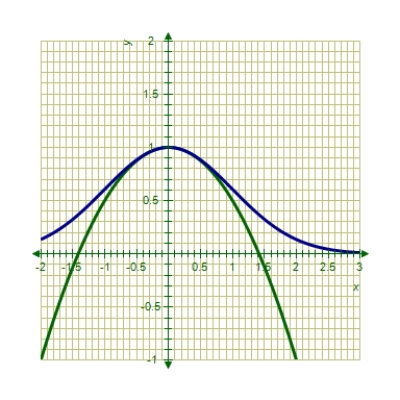
B) 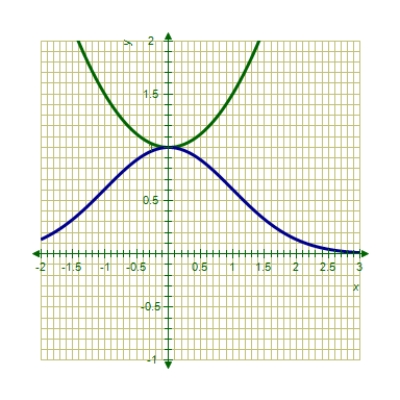
C) 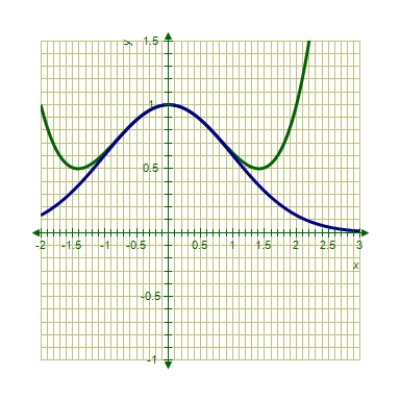
D) 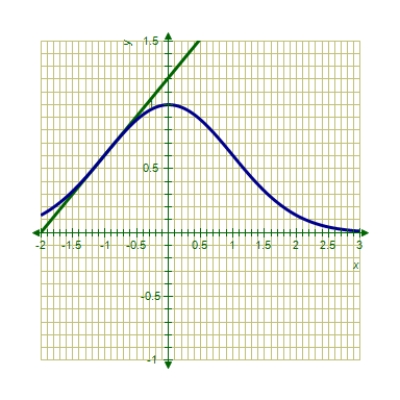
E) 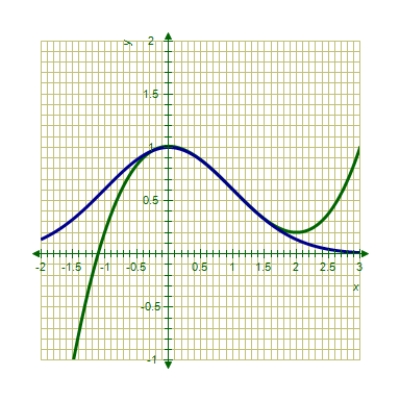
 is given below.Use a graphing utility to graph both functions.
is given below.Use a graphing utility to graph both functions. 
A)

B)

C)

D)

E)


Unlock Deck
Unlock for access to all 104 flashcards in this deck.
Unlock Deck
k this deck
67
Differentiate the series for  to find the power series for the function
to find the power series for the function 
A) 
B) 
C) 
D) 
E) 
 to find the power series for the function
to find the power series for the function 
A)

B)

C)

D)

E)


Unlock Deck
Unlock for access to all 104 flashcards in this deck.
Unlock Deck
k this deck
68
Apply Taylor's Theorem to find the power series centered at  for the function
for the function 
A) 
B) 
C) 
D) 
E) 
 for the function
for the function 
A)

B)

C)

D)

E)


Unlock Deck
Unlock for access to all 104 flashcards in this deck.
Unlock Deck
k this deck
69
A Taylor polynomial approximation of  is given below.Use a graphing utility to graph both functions.
is given below.Use a graphing utility to graph both functions. 
A) 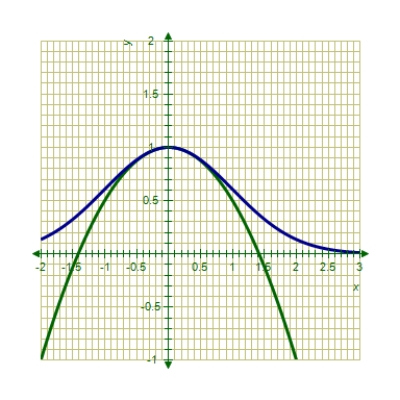
B) 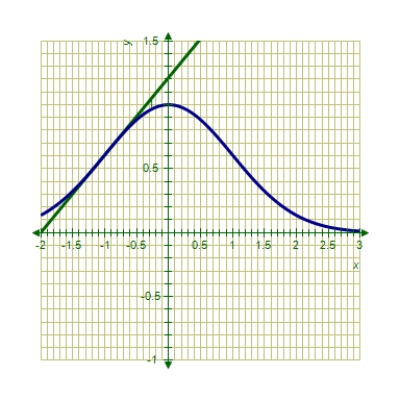
C) 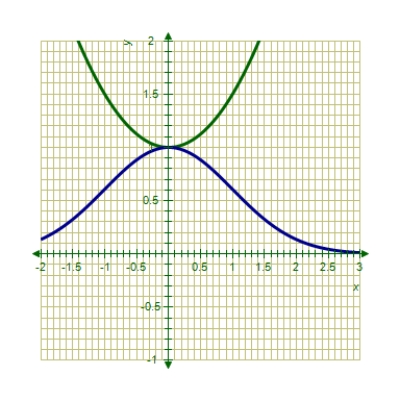
D) 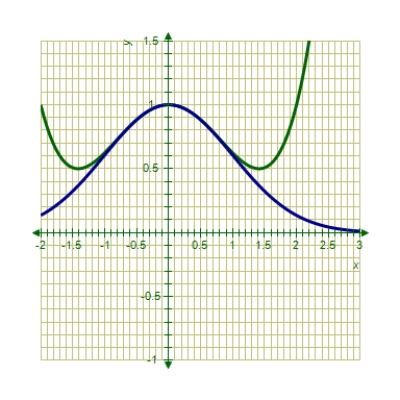
E) 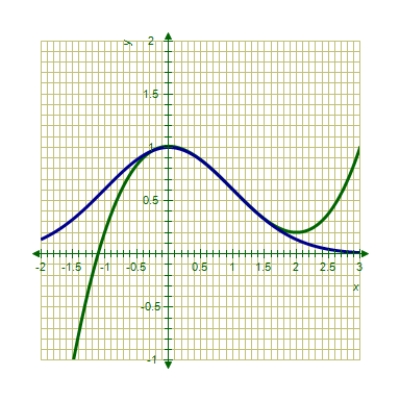
 is given below.Use a graphing utility to graph both functions.
is given below.Use a graphing utility to graph both functions. 
A)

B)

C)

D)

E)


Unlock Deck
Unlock for access to all 104 flashcards in this deck.
Unlock Deck
k this deck
70
Find the power series for the function  using the power series for
using the power series for 
A) 
B) 
C) 
D) 
E) 
 using the power series for
using the power series for 
A)

B)

C)

D)

E)


Unlock Deck
Unlock for access to all 104 flashcards in this deck.
Unlock Deck
k this deck
71
Find the radius of convergence centered at  for the following function.
for the following function. 
A) 4
B) 2
C) 0
D) 1
E) 
 for the following function.
for the following function. 
A) 4
B) 2
C) 0
D) 1
E)


Unlock Deck
Unlock for access to all 104 flashcards in this deck.
Unlock Deck
k this deck
72
Use a symbolic differentiation utility to find the Taylor polynomials (centred at zero)of degrees (a)2,(b)4,(c)6,(d)8. 
A)  ,
,  ,
,  ,
, 
B)  ,
,  ,
,  ,
, 
C)  ,
,  ,
,  ,
, 
D)  ,
,  ,
,  ,
, 
E)  ,
,  ,
,  ,
, 

A)
 ,
,  ,
,  ,
, 
B)
 ,
,  ,
,  ,
, 
C)
 ,
,  ,
,  ,
, 
D)
 ,
,  ,
,  ,
, 
E)
 ,
,  ,
,  ,
, 

Unlock Deck
Unlock for access to all 104 flashcards in this deck.
Unlock Deck
k this deck
73
Find the radius of convergence centered at  for the following function.
for the following function. 
A) 4
B) 2
C) 0
D) 1
E) 
 for the following function.
for the following function. 
A) 4
B) 2
C) 0
D) 1
E)


Unlock Deck
Unlock for access to all 104 flashcards in this deck.
Unlock Deck
k this deck
74
Find the radius of convergence of  where
where 
A) 1
B) ∞
C) 
D) 8
E) 16
 where
where 
A) 1
B) ∞
C)

D) 8
E) 16

Unlock Deck
Unlock for access to all 104 flashcards in this deck.
Unlock Deck
k this deck
75
Find the radius of convergence centered at  for the following function.
for the following function. 
A) 4
B) 2
C) 0
D) 1
E) 
 for the following function.
for the following function. 
A) 4
B) 2
C) 0
D) 1
E)


Unlock Deck
Unlock for access to all 104 flashcards in this deck.
Unlock Deck
k this deck
76
Apply Taylor's Theorem to find the power series centered at  for the function
for the function 
A) 
B) 
C) 
D) 
E) 
 for the function
for the function 
A)

B)

C)

D)

E)


Unlock Deck
Unlock for access to all 104 flashcards in this deck.
Unlock Deck
k this deck
77
Integrate the series for  to find the power series for the function
to find the power series for the function 
A)
B)
C)
D)
E)
 to find the power series for the function
to find the power series for the function 
A)

B)

C)

D)

E)


Unlock Deck
Unlock for access to all 104 flashcards in this deck.
Unlock Deck
k this deck
78
Find the power series for the function  using the power series for
using the power series for 
A) 
B) 
C) 
D) 
E) 
 using the power series for
using the power series for 
A)

B)

C)

D)

E)


Unlock Deck
Unlock for access to all 104 flashcards in this deck.
Unlock Deck
k this deck
79
A Taylor polynomial approximation of  is given below.Use a graphing utility to graph both functions.
is given below.Use a graphing utility to graph both functions. 
A) 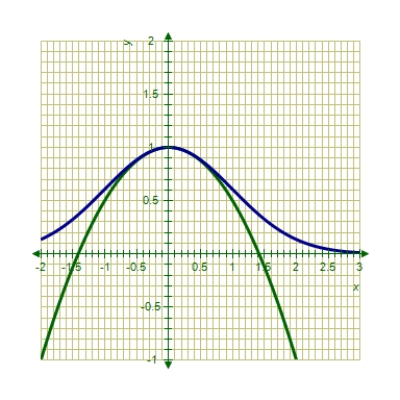
B) 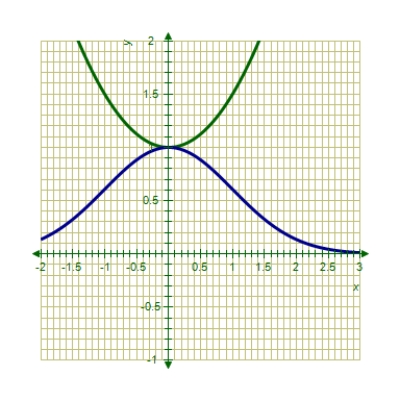
C) 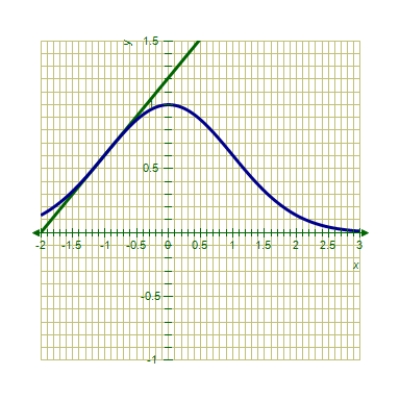
D) 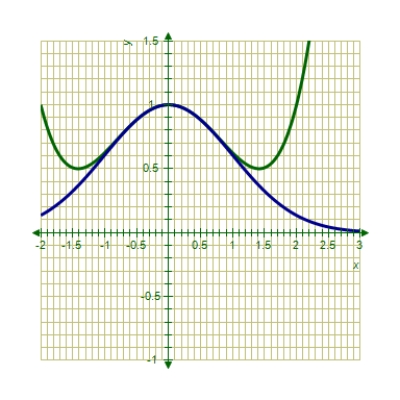
E) 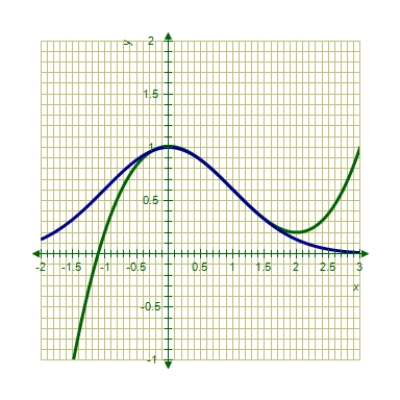
 is given below.Use a graphing utility to graph both functions.
is given below.Use a graphing utility to graph both functions. 
A)

B)

C)

D)

E)


Unlock Deck
Unlock for access to all 104 flashcards in this deck.
Unlock Deck
k this deck
80
A Taylor polynomial approximation of  is given below.Use a graphing utility to graph both functions.
is given below.Use a graphing utility to graph both functions. 
A) 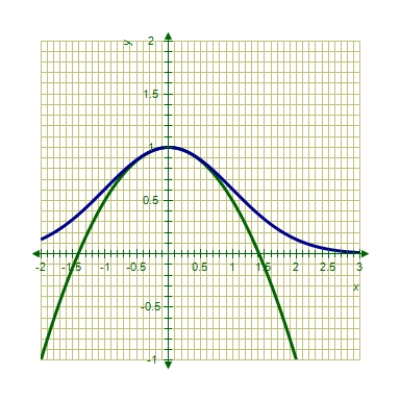
B) 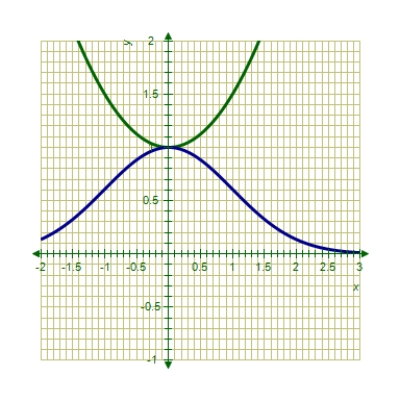
C) 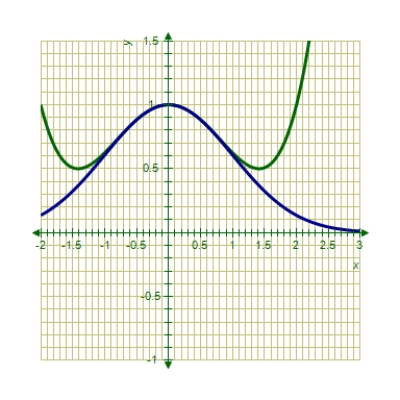
D) 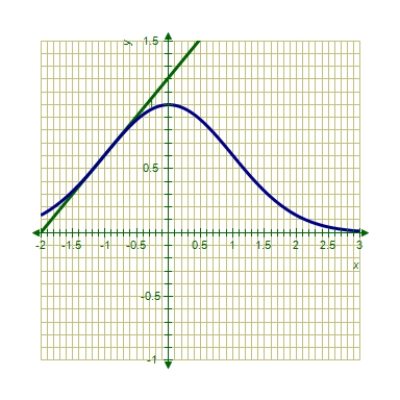
E) 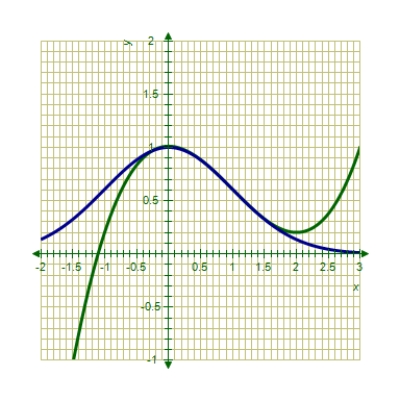
 is given below.Use a graphing utility to graph both functions.
is given below.Use a graphing utility to graph both functions. 
A)

B)

C)

D)

E)


Unlock Deck
Unlock for access to all 104 flashcards in this deck.
Unlock Deck
k this deck


